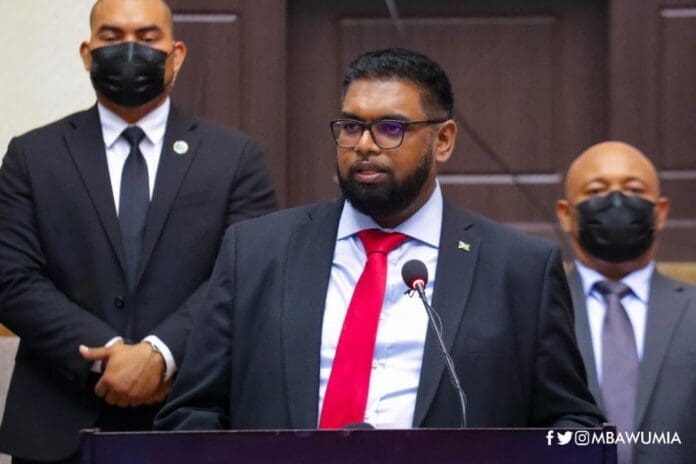Guyanese President Mohamed Irfaan Ali has secured a decisive second five-year term after his People’s Progressive Party won eight of ten electoral districts in Monday’s general election, according to official results released by the Guyana Elections Commission.
The PPP/C secured 242,498 votes, capturing majorities in Regions One, Two, Three, Four, Five, Six, Eight and Nine, while the newly-formed We Invest in Nationhood party emerged as a significant force with approximately 109,000 votes in its debut election.
The victory comes amid ongoing debates over how Guyana should manage its massive oil wealth, discovered by ExxonMobil in 2019, which has transformed the South American nation into one of the world’s fastest-growing economies. With a population of 800,000, Guyana now has among the highest proven crude oil reserves per capita globally.
Ali, 45, campaigned on promises to leverage oil revenues for infrastructure development and poverty reduction while managing territorial tensions with Venezuela over the disputed Essequibo region. Though voter turnout was lower than in 2020, PPP officials, including Vice-President Bharrat Jagdeo, have suggested the party is poised to secure a larger parliamentary majority in the 65-seat National Assembly.
The election was overshadowed by a security incident the day before voting, when Guyanese police reported that a boat carrying election officials and ballot boxes was shot at from the Venezuelan shore in the contested Essequibo region. Venezuela denied involvement in the incident, which highlighted ongoing tensions over the oil-rich territory.
We Invest in Nationhood, led by businessman Azruddin Mohamed, made a strong showing despite being founded only three months ago, positioning itself as an alternative to Guyana’s traditionally dominant PPP and opposition A Partnership for National Unity parties. Mohamed alleged voting irregularities while celebrating his party’s impact on the political landscape.
The campaign centered heavily on oil revenue management, with opposition parties accusing the PPP of unfairly distributing petroleum earnings to connected groups. The ruling party denied these allegations while highlighting economic growth achievements during Ali’s first term.
Since 2019, ExxonMobil has discovered billions of barrels worth of oil in Guyanese waters, causing the state budget to quadruple and positioning the country as a major regional oil producer. However, debates continue over whether ordinary Guyanese are benefiting adequately from this wealth.
Commonwealth observers who monitored the election have urged Guyana to implement crucial recommendations aimed at enhancing the credibility and transparency of future elections, while Organization of American States observers deployed to monitor the poll have not yet reported instances of electoral fraud.
The A Partnership for National Unity, which governed from 2015-2020, trailed in third place, marking a significant decline from its previous position as the main opposition party. The emergence of WIN as the second-place finisher represents a major shift in Guyana’s political landscape.
Ali’s victory provides continuity for policies aimed at maximizing benefits from oil revenues while maintaining democratic governance. The president has emphasized the need to balance economic development with environmental protection and social equity.
The election results reflect public confidence in the PPP’s economic management during a period of unprecedented growth, though opposition parties continue raising concerns about transparency and equitable distribution of oil wealth.
Regional observers note that Guyana’s democratic institutions have remained stable despite economic transformation and external pressures, including Venezuela’s territorial claims and the challenges of managing sudden resource wealth.
The second term will test Ali’s ability to address opposition concerns about oil revenue distribution while maintaining economic growth and navigating complex regional security challenges, particularly with Venezuela’s continued claims over Essequibo.
Looking ahead, the new government faces expectations to deliver tangible improvements in living standards for ordinary Guyanese while managing the country’s emergence as a significant oil producer in an increasingly complex geopolitical environment.
Source: newsghana.com.gh











